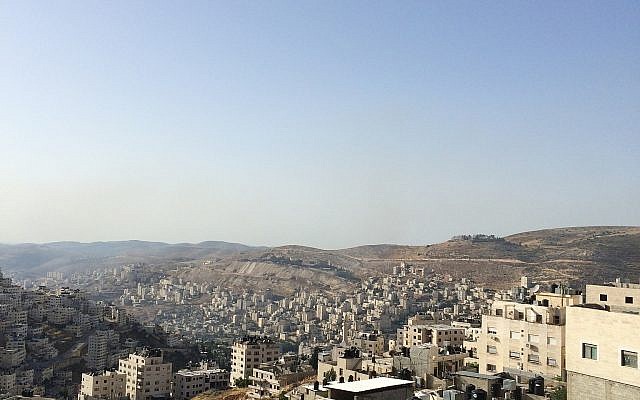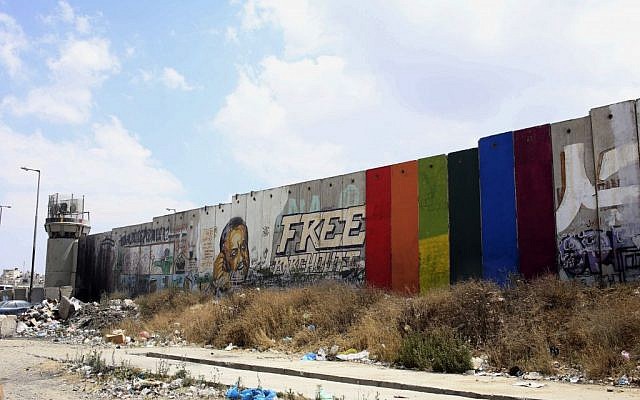Palestinian Police Denies LGBT Group From Holding Activities at The West Bank
By ADAM RASGON
Palestinian Authority police have banned a Palestinian LGBT rights group from organizing any activities in the West Bank and threatened to arrest them, saying such activities are contrary to the “values of Palestinian society.”
In a statement Saturday, police spokesman Louay Arzeikat said events such as those organized by the group al-Qaws “go against and infringe upon the higher principles and values of Palestinian society.”
Arzeikat also charged that “suspicious parties” were trying to “sow discord and undermine Palestinian society’s peaceful state of affairs” and asserted that the police would pursue al-Qaws’s staff and turn them over to judicial authorities if it successfully collars them.
He also called on Palestinians to report on any al-Qaws activity, promising informers confidentiality.
Al-Qaws is an non-governmental organization established in 2001 that aims to support gay, lesbian, bi-sexual and transgender Palestinians and Arab Israelis. It’s website says it has offices in East Jerusalem and Haifa; PA security forces cannot enter those areas, according to agreements between Israel and the Palestine Liberation Organization.
The police statement came after al-Qaws said on its Facebook page that it had held a gathering in the northern West Bank city of Nablus on August 4 that discussed gender pluralism in the city.
It also said it was planning to hold a “queer camp” on August 30 and 31 at a location to be announced at a later date.
It said the two-day program “provides a place for gay, lesbian, bisexual and transgender youth from Palestine to meet, learn about the basic concepts of gender pluralism and explore the different sides of our human sexuality.”
The group says it “is at the forefront of vibrant Palestinian cultural and social change, building LGBTQ communities and promoting new ideas about the role of gender and sexual diversity in political activism, civil society institutions, media, and everyday life.”
While there are no PA laws on the books that ban homosexual acts, the Palestinian LGBT community largely exists underground due to familial, religious and government repression, a source familiar with the matter, who spoke on condition of anonymity, told The Times of Israel.
Later Sunday evening, al-Qaws condemned the police statement as “very unfortunate” and urged authorities to familiarize themselves with its work.
The group noted that the police statement had come just hours after “an unprecedented assault by dozens of people on al-Qaws’s social media pages including threats of violence.”

A view of Nablus in the northern West Bank. (Adam Rasgon/The Times of Israel)
On Sunday The Times of Israel was only able to locate a few threatening posts made by Palestinians on al-Qaws’s social media pages. But Laith Itmaiza, who used to work as a journalist at Quds News Network, wrote on his Facebook page that he had counted 643 comments written on Saturday evening in the span of three hours by Palestinians against the LGBT community.
Haneen Maiki, the director of al-Qaws, told Ultra Palestine, a Palestinian news site, that the despite the PA police’s statement, the group “would continue its work in different parts of Palestine, while taking into account the generally loaded atmosphere because of media outlets and the police’s incitement, so that we do not put any of our activists or friends at risk.”
Ahmad Harb, commissioner-general of the Independent Commission for Human Rights, lashed out at police, saying that they were effectively calling for vigilante action.
“The Palestinian police’s statement regarding the barring of the gathering of ‘gays’ and activists from the al-Qaws organization and threatening to pursue them and asking citizens to secretly inform on ‘suspects’ is very bad,” Harb wrote on his Facebook page. “It rises to the level of calling for ‘community violence and inciting a crime.’ Many understood this statement as a call to wastefully spill blood and take the law into one’s hands by implementing killing operations.”
“This is not how issues are handled. This is not how the police protects its citizens,” he added.

Comments